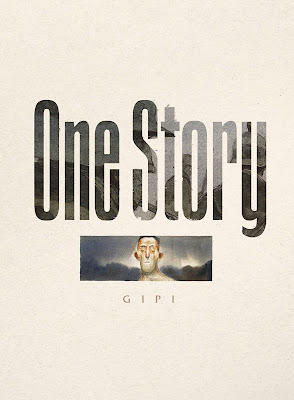
The title of this book, One Story, is a lie. It is not one story. It’s probably not even two stories but a multitude of them. Gipi sculpts a story around two men’s memories, around their shared history that is tied together by the name Landi and by the blood that makes them family. Gipi opens the book with a monologue about age and memory. It’s a monologue that we later find out that Silvano Landi has bored and frustrated his daughter with and you almost can’t blame her. Like her, for the reader, it’s a frustrating start to the book that you need to come back to once you have finished the book. His daughter is angry because she’s heard it before and she knows she’ll hear it again from her father. But for us, the monologue lays out in front of us every concern that Gipi wants to explore in this book but it’s coded, and the pages that follow it hold the key to the code.
The monologue tells us about two people, one of them eighteen-year-old and waking up suddenly to find that they aged 32 years overnight while the other person wakes up every day of those 32 years, one day at a time, to gradually grow into their 50-year-old face, Gipi lays out everything about the book but we can’t see that yet until we read the rest of it. There’s a mystery about what this book is going to be and what journey it is going to take us on. It follows two people with two different paths but ultimately, there are connections between them that bring their paths together. It is incredible the confidence Gipi has, essentially explaining the story in the first few pages without ever giving anything away about what we’re going to experience in the rest of the book. These first few pages spark our thoughts about how we experience life and how those experiences change over time and then we get to put those thoughts into practice reading Mauro and Silvano’s stories.

An even more puzzling interlude follows the monologue. Two men take a drive in an old Maserati, the driver telling the other man to stop thinking about life, death, and turning fifty. So after the opening monologue but before the story begins (unless it already has and we just missed it,) Gipi inserts a story beat that tries to brush off the heady musings of the previous pages but the book and the cartoonist can never fully shake those thoughts. From this brief encounter, we follow these two men, Mauro Landi and Silvano Landi- great grandfather and great-grandson, as one fights desperately to survive the trenches of World War I while the other struggles in a psych ward, alone after an emotional breakdown. Gipi’s unconventional entry into his story provides a tension of uncertainty that we carry with us through the whole book.
Mauro and Silvano are separated by 100 years and a couple of generations. Silvano knows about Mauro from stories handed down and letters that his great grandfather sent to his great grandmother back home, dreaming of a future for their family even while he was in Europe with death all around him. These are two men living two different lives in incredibly different times. They would hardly recognize the life that the one man is experiencing. Everything in Gipi’s story tries to trick us into thinking that Mauro and Silvano’s stories are two separate and different stories.
Gipi’s artwork adds to the mysterious air of the book. At times, he uses watercolors and gray washes to tell the store. At other times, it’s just a scratchy pen, drawing the raw nerves of the characters. Creating different pictorial planes through the tools he has, Gipi’s ever-shifting technique just adds to the unsteadiness of the characters and the readers. Mauro’s time in the trenches is largely told through color or washes, creating an atmosphere of both the warfare that’s being fought all around him but also the inner turmoil of being trapped and fearing for his life. It’s a different type of turmoil that Silvano is living through but the painted colors of his sequences create an experiential synergy between the two men across the years and across the pages.

When Gipi drops to the color to use only his rough pen line, an odd sense of stepping outside of the story occurs. These moments are happening but seem somehow apart from the actual events of the story. They’re almost metatextual elements of the trauma of these men’s lives and times. By dropping the color, it’s almost like Gipi is dropping out the world around his characters, giving them an existence that’s narrowed down to just these stark moments of time.
So for this story of two generations, both men’s lives circle around thoughts of a family— of their individual and ultimately their shared families. Mauro, a young man at war, writes letters to his wife back home, trying to find the words that would encourage him as much as they would comfort his wife and young son. On one page, Gipi shows us these letters through Mauro’s discarded drafts, words and whole thoughts scribbled out because they were not the right words. Decades later, Silvano, a writer himself, will find boxes of the letters that made it to his great grandmother and he would marvel at the words of his great grandfather. For Mauro, the letters are a lifeline but for Silvano, they’re a revelation of people he knows just from family stories.
Mauro’s family is just starting but Silvano’s has already fallen apart, separated from his wife and a burden for his daughter. In the hospital, the healing he needs is for reconciliation, if not to be together with his family but at least for some kind of peace and understanding with them. It’s heavily implied that the dissolution of his family is somehow his fault as if he lost the ability to relate to his wife and daughter at some point in their lives together. The one thing that seems to keep Mauro going 100 years earlier is his desire to be again with his wife and child; that’s the need that will make him survive this brutal and deadly war.
So maybe the title of the book isn’t a lie. Maybe this is truly one story just told over the span of a century. This family was forged in war as Mauro, scarred and desperate, commits acts of war that will haunt him for the rest of his life. And maybe those acts spoiled something in this family, something that simmered for generations until it found a catalyst in Silvano’s life. It is the beginning and the end of a family and of love but it courses over years and over generations of people.
Gipi first published this comic when he was 50 years old and there’s a feeling of both looking backwards and forwards in this book and in these lives. So much can have already happened in the first 50 years of a life as we witness in the lives of Mauro and Silvano. Lives are lived in that span of time with the promise of so much more after that. Gipi approaches this book at a point of taking stock of a life, trying to determine its worth and how to move forward from there. Whether it’s the trenches of war or the psych ward, these two men are in a moment of time where they are trying to find a way forward. The future for both men seems like one of Gipi’s gray night skies, dark and heavy but with the slightest hint of light in the distance. But how do you get there? Gipi doesn’t seem to have that part figured out yet.
One Story
Written and Drawn by Gipi
Translated by Jamie Richards
Published by Fantagraphic Books








